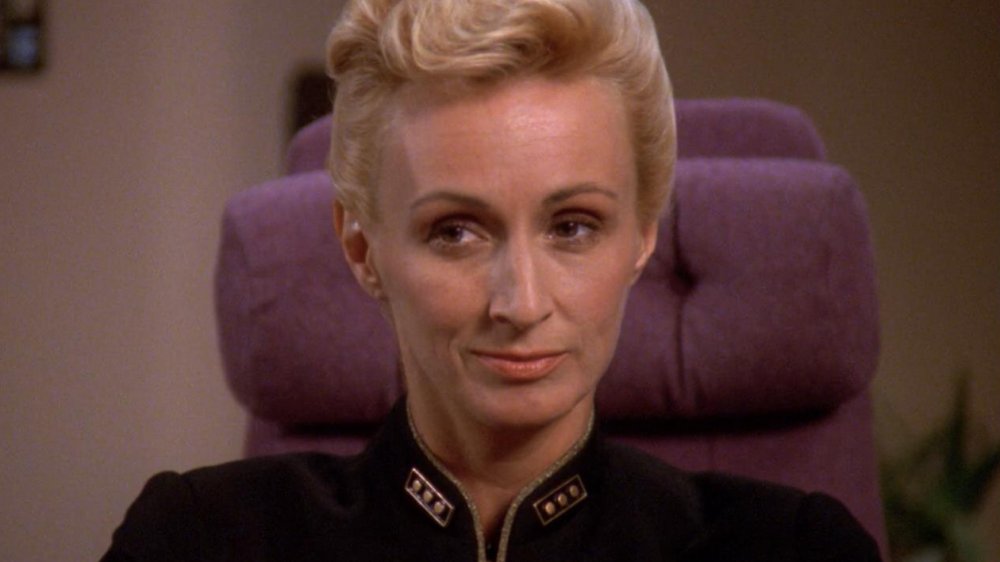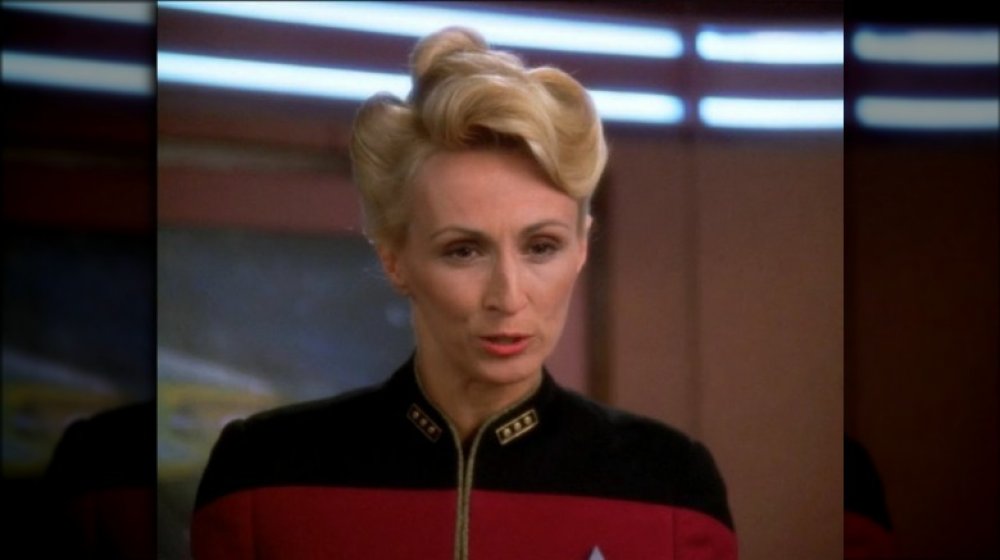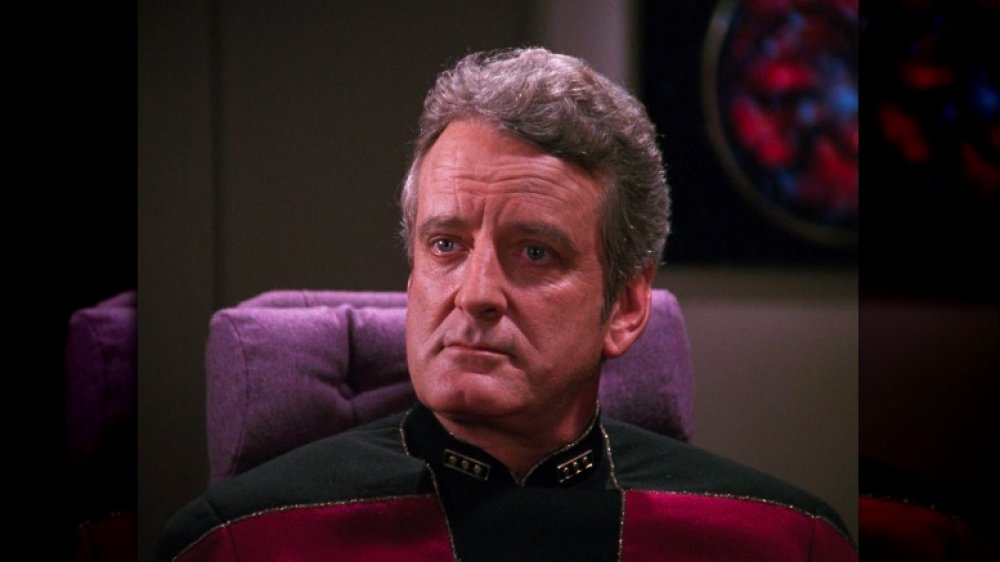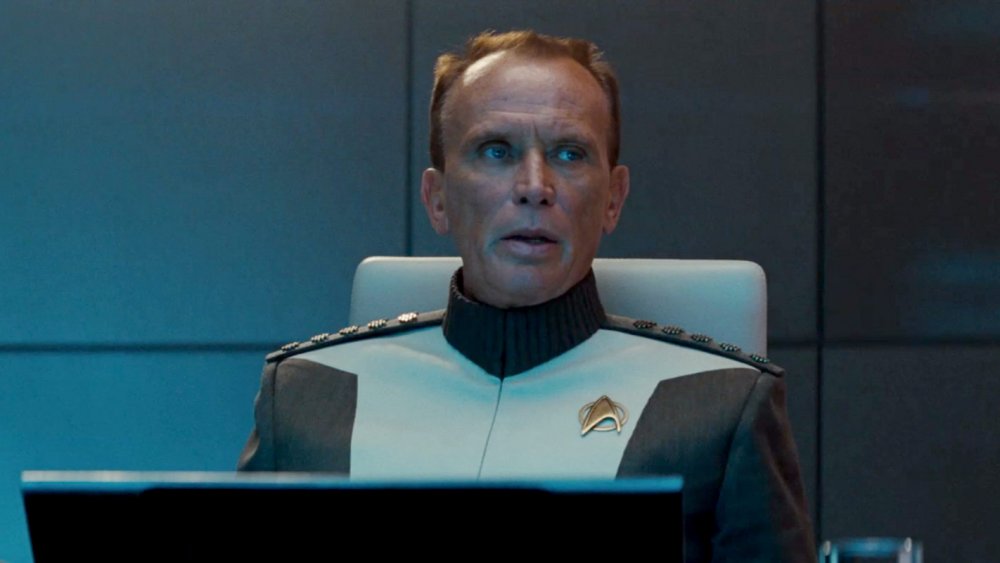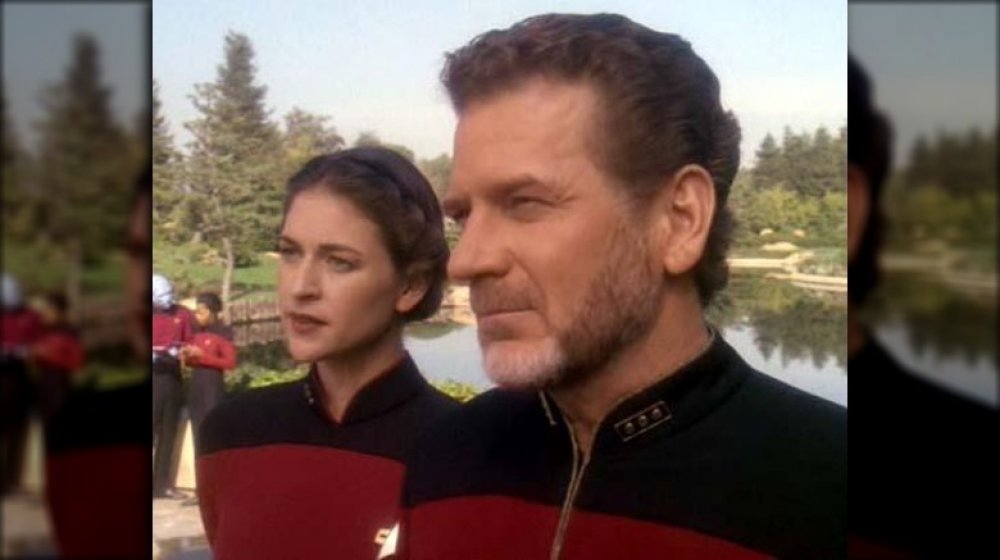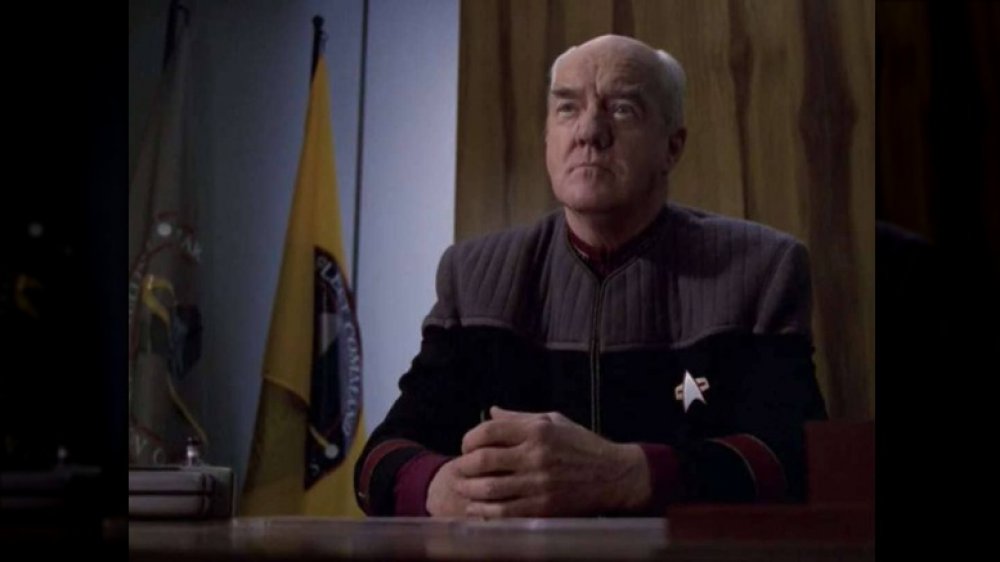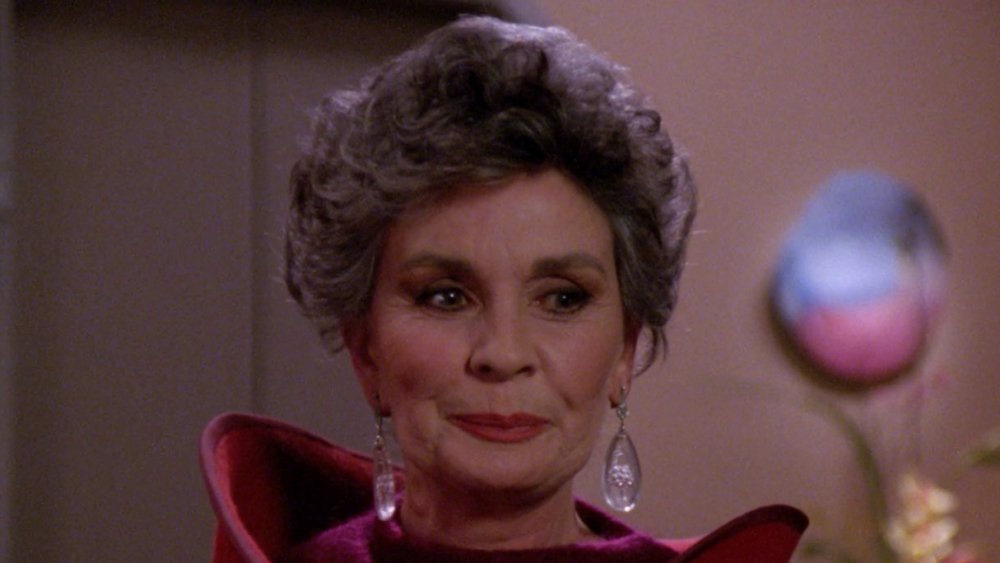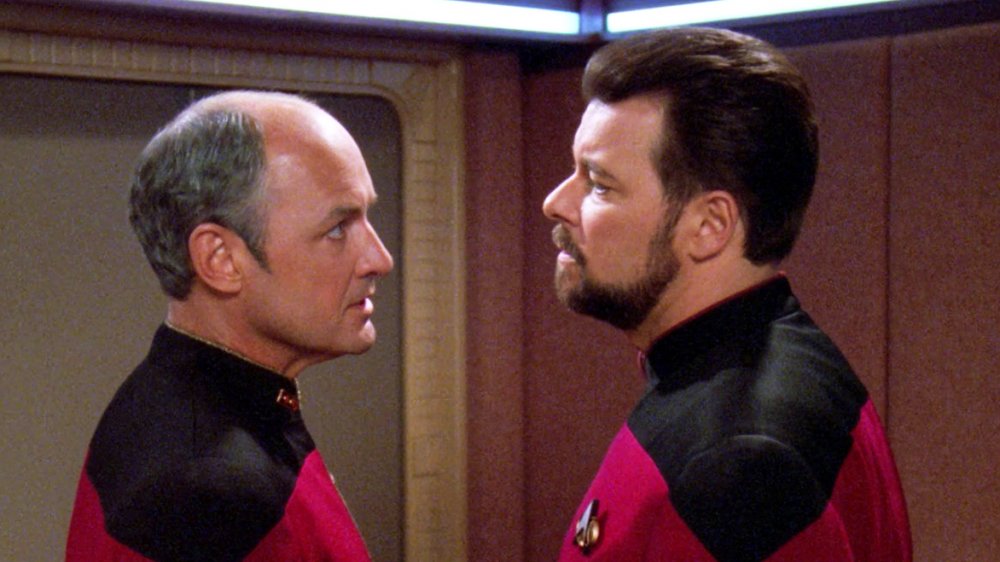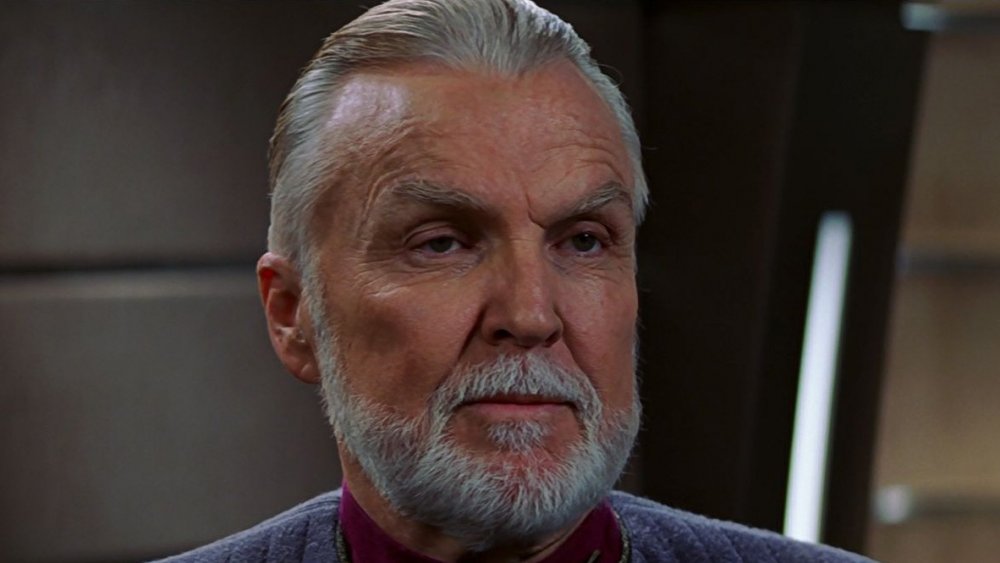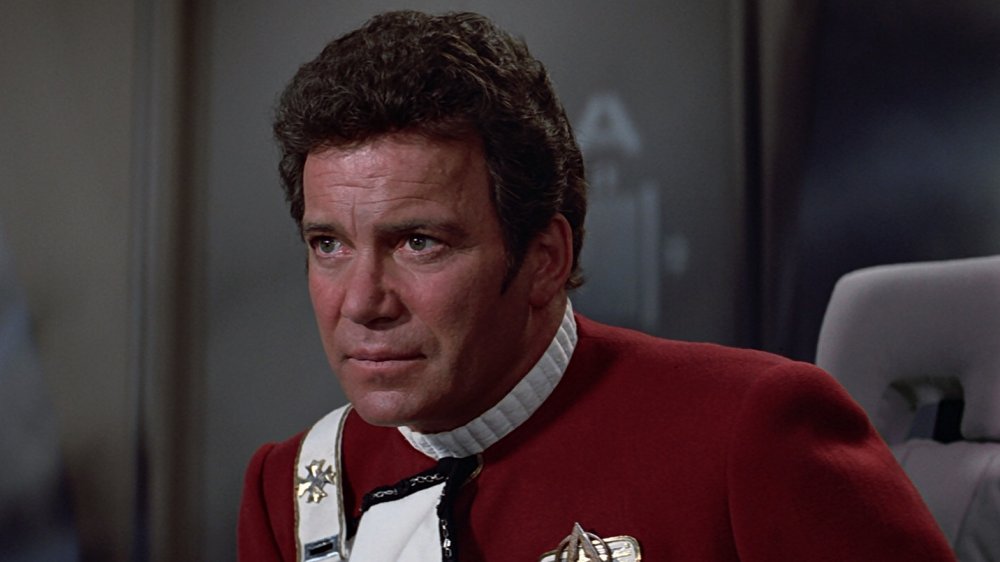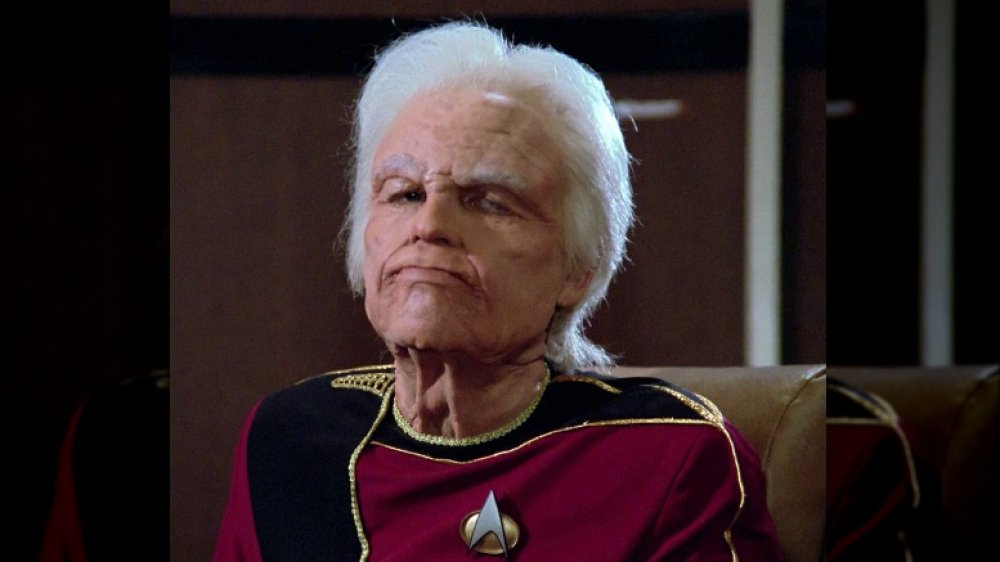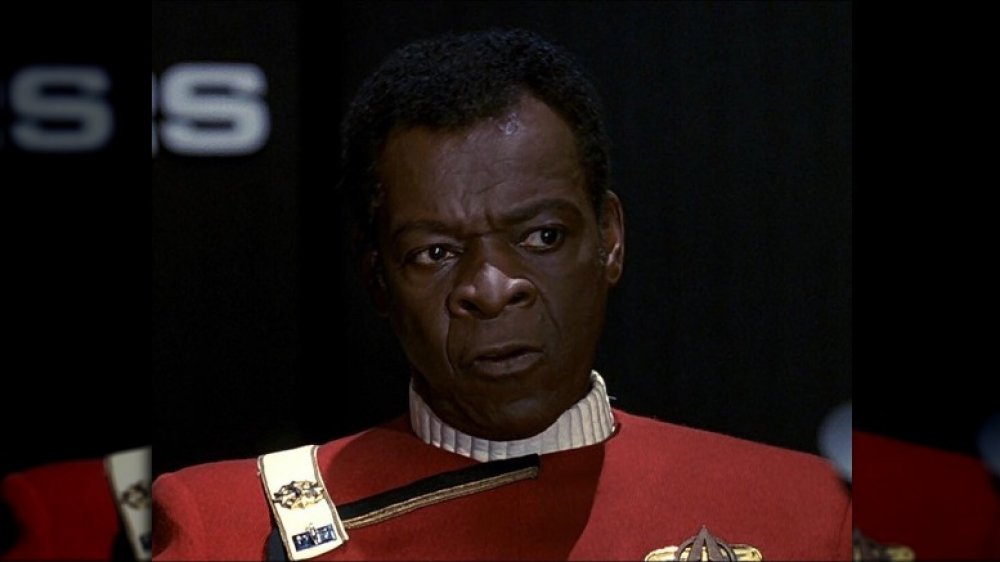The Worst Starfleet Admirals On Star Trek
In the world of Star Trek, one of the greatest enemies of the United Federation of Planets is calling from inside the house. We're speaking, of course, of the admirals of Starfleet.
There are probably plenty of decent, hardworking admirals in the upper echelons of Starfleet, but they're not the ones getting screen time. Instead, we're confronted, over and over, with a bevy of hard-headed, sometimes downright criminal leaders who only seem to be in their high-ranking positions for their own selfish reasons. Even Starfleet doesn't seem to be immune from the deadly effects of failing upwards, essentially defined by Fortune as the real-world phenomenon of idiots getting promoted over everyone else.
This isn't a mere matter of office politics, however. These admirals are truly the worst of the worst. Your incompetent boss may get reports in late or even steal a sandwich or two from the break room, but are they encouraging genocide? How many civil wars have they begun? Are they currently involved in any conspiracies? Have they ever tried to steal an android's newly formed robot daughter and lock her away in a research lab for an undisclosed period of time?
It's genuinely hard to overstate just how truly bad some of Starfleet's admirals have gotten. Perhaps some of them should come with individual security personnel, not to protect them so much as to protect others from these power-mad cretins who believe that they run Starfleet.
Admiral Nechayev hand-waved genocide
Alynna Nechayev appears on Star Trek: The Next Generation seemingly to act only as a thorn in Captain Picard's side. To Admiral Nechayev's discredit, she often misses the subtleties of a situation to near-disastrous effect. According to Memory Alpha, this also means that she wants to enact her plan without considering the diplomatic niceties involved. Weird for a Starfleet admiral, to be sure, but even stranger because it leads her to almost order a genocide.
In season six's "Descent," Vice Admiral Nechayev visits the Enterprise and upbraids Captain Picard for not sending a captured Borg back to his ship with a deadly computer virus. The viral program would have crippled the Borg, a villainous collective bent on forcibly assimilating any intelligent life in its path. Though the Borg are genuinely terrifying adversaries that care little for emotion or negotiation, Picard argued that they were still living beings. The unimpressed Nechayev orders him to deploy the program the next time he gets a chance.
The next season, Nechayev is promoted to admiral and ready to wreak further havoc. In season seven's "Journey's End," she orders the removal of colonists from a planet in the demilitarized zone between Federation and Cardassian territory. That's awkward enough, but these colonists are of Native American descent. It's a clunky episode already, but Nechayev's turn as a cartoonish villain adds yet another dark mark to her résumé.
Admiral Haftel attempted to take Data's daughter
Though the admirals of Starfleet seem bent on failing upwards, Haftel's scheme to separate a father and his daughter really exceeds the already grim expectations. Guess we'll have to add breaking up families to the list of the admiralty's sins.
Said father is Data, the fan-favorite android character serving aboard the Enterprise on Star Trek: The Next Generation. He's always trying to figure out human emotions, which seem at once both utterly incomprehensible and incredibly desirable. As part of this attempt, reports Tor.com, Data creates a child in season three's "The Offspring," engineering a new android and using his own high-tech positronic brain as a template. The resulting being decides to present as female, taking the name "Lal." All seems well until, inevitably, an admiral gets wind of this development.
Enter Vice Admiral Haftel. He's part of Starfleet's research arm and simply must see Data's new achievement. No one has been able to reproduce Data's positronic brain until now, so Lal is quickly at the center of some very interesting questions. Haftel proposes taking Lal to a research laboratory. No, Data doesn't need to go along. Why is everyone so upset all of a sudden?
Haftel's ploy to break apart the father-daughter duo fizzles out when Lal's positronic brain malfunctions. She dies in Data's arms, leaving the admiral to slink off and enact some other family-ruining plot.
Admiral Marcus tried to start a war
What is it with admirals and the desire to start a war? If a candidate were to say that genocide is wrong, or that maybe there's a peaceful diplomatic solution that doesn't involve any assassinations, does a committee demote them to an ensign peeling potatoes in a dank kitchen somewhere?
Admiral Alexander Marcus, from the alternate-universe world of 2013's Star Trek: Into Darkness, obviously passed this test. As per Memory Alpha, he was so renowned that he became head of Starfleet in the 23rd century. But, for all of his professional success, mentoring of big names like Christopher Pike and James T. Kirk, and love of the Federation, Marcus hid a dark motive deep within his soul.
After the destruction of Vulcan, as seen in the first reboot film released in 2009, Marcus wanted to defend the rest of the Federation. Seeking greater militarization, he defrosted Khan, a genetically enhanced supervillain. With Khan creating weapons and ships, Marcus reasoned, everything would be dandy. Of course, Khan went off script and did his villainous thing. Then, there was the matter of inciting war with the Klingons, secretly spearheaded by Marcus. Ultimately, the incredibly strong Khan caught up with Marcus and crushed his skull with his bare hands, since Khan was indeed an incredibly dangerous supervillain. Marcus was thus granted a gory and highly cinematic death while shirking any other consequences.
Admiral Leyton framed the Changelings
The plague of bumbling, genocidal, and just generally vicious Starfleet admirals has invaded nearly every Star Trek series. Star Trek: Deep Space Nine, famous for its morally gray outlook on the Federation in general, certainly wasn't one to make an exception. Perhaps the worst admiral seen on the series was bent on framing an entire civilization, enacting a military coup, and establishing a dictatorship on Earth.
In the season four two-parter "Homefront" and "Paradise Lost," Captain Sisko and company made the journey from Deep Space 9 back to planet Earth. According to the Tor.com recaps of the two-parter, Sisko was concerned that the Changeling species was sneaking into his quadrant of the galaxy and invading Federation planets like Earth.
According to Memory Alpha, when Vice Admiral Leyton learned of the possible Changeling threat, he approached the Federation president with the proposal that they enact sweeping security laws. The president balked at the draconian measures and vetoed the whole affair. Instead of accepting this and finding an above-board strategy, Leyton started an old-fashioned conspiracy. Using some overly loyal Starfleet cadets known as the "Red Squad," he generated paranoia about Changelings in an attempt to make way for a military coup. He even tampered with a satellite to produce false images of an invasion force, Scooby-Doo style. When Sisko uncovered the plot, not unlike Fred unmasking the latest villain, Leyton got off relatively easy by tendering his resignation.
Admiral Paris doesn't care about conflict of interest
To be fair, Admiral Owen Paris isn't the absolute worst Starfleet admiral to stalk across the screen on an episode of Star Trek. As far as we know, he hasn't tried to plot genocide or overthrow the Federation, so it's clear that he doesn't rank at the absolute bottom of the list. Still, he's a blustery officer who also really seems to be lacking as a father.
As per Memory Alpha, Admiral Paris was put in command of the Pathfinder Project, a long-range communications effort that successfully put Starfleet in contact with the previously lost starship Voyager. That's a bit of a sticky situation, since the admiral knew that his own son, Tom Paris, was aboard the ship. Arguably, Admiral Paris should have recused himself, seeing as this is a real conflict of interest, but it was never brought up.
Perhaps that's because he was rather famously gruff and distant with his son and family. Can you really have a conflict of interest if your relationship with your son is pretty weak already? Throughout Star Trek: Voyager, Tom Paris refers to his father's high expectations and cold persona. Toward the end, Admiral Paris makes contact and seems thoroughly uninterested in his own son's well-being or the fact that he has a new granddaughter on board. Again, it's no genocide, but it's not exactly the best behavior, either.
Admiral Satie tries to recreate The Crucible
At the end of a Starfleet admiral's career of terror, there is at least one light at the end of the tunnel: retirement. When an admiral hangs up their overly decorated uniform for the final time, there is the hope that they will fade into obscurity and just traumatize their own family for a change. In at least one case, however, retirement was no obstacle for one admiral ready to traumatize a whole flagship full of people.
It all goes down on Star Trek: The Next Generation, in season four's "The Drumhead." As per the Tor.com recap, things seem to be going normally in an officer exchange program with the Klingons. Then, the Klingon officer, J'Dan, is discovered to be transmitting secrets, very likely to the devious Romulans. After concerns emerge that someone on the Enterprise may have helped J'Dan, Admiral Norah Satie is called out of retirement to conduct an investigation.
It quickly turns into a witch hunt. Satie employs progressively more invasive and illegal methods to achieve what she believes is a noble end: finding the Romulan collaborator. It's not unlike the play The Crucible, wherein a hysterical group targets innocent people. Thankfully, no one on the Enterprise dies, and Satie's investigation is shut down after another admiral witnesses her methods. Still, her willingness to do practically anything, apart from using caution and morality, remains ultimately chilling.
Admiral Pressman took part in a cover-up
Cloaking devices have long been a big deal throughout multiple Star Trek series. Yet, for much of Star Trek history, the Federation didn't have cloaking technology. That's because the Federation was one of the signatories of the Treaty of Algernon. According to Memory Alpha, the treaty, signed in 2311, ended a devastating war and prohibited the Federation from developing its own cloaking tech.
Admiral Erik Pressman has decided that he's got no time for such foolishness. All those decades of peace, however tense, aren't enough to make up for the lack of the tactical advantage of a cloaking device in Federation hands. Memory Alpha reports that Pressman, when captain of the Pegasus in 2358, tested a secret cloaking device on his ship. However, when the top secret mission is leaked to his crew, they mutiny. Pressman and a small group of officers, including a young ensign named William T. Riker, escaped and watched as the Pegasus, its cloaking device, and the remaining crew, were apparently destroyed.
Years later, Pressman is now a rear admiral, sent to retrieve what's left of the Pegasus when the Romulans start getting suspicious. Pressman is intercepted by Captain Picard, whose first officer is none other than Will Riker. A guilty Riker admits the true nature of the Pegasus incident, leading Picard to bring the unrepentant Pressman to justice. On the other hand, the devious Pressman claims to have many well-placed friends. One wonders if, like so many other admirals, he'll escape real consequences.
Admiral Dougherty tried to hoodwink an entire planet
Even Star Trek films aren't really safe from the admiral scourge. In Star Trek: Insurrection, one takes part in an overly elaborate plan to hoodwink an entire planet of people out of eternal life.
To be fair, the Ba'ku people living on the planet wouldn't have known what was going on if it weren't for those meddling Starfleet officers. As per Memory Alpha, Admiral Matthew Dougherty had teamed up with the villainous Son'a, led by Ru'afo, to trick the relatively small colony onto a holoship (meant to mimic their village), where they would be unknowingly whisked away from their planet and its metaphasic particles. Said particles perpetually rejuvenate everyone in their path, granting eternal youth.
Like every villain in a 1990s film with an ecological focus, Admiral Dougherty wants to make bank on the natural resources of this planet. Never mind that the process will ruin the environment and leave the Ba'ku fully mortal like the rest of us aging losers. He's also guilty of a cover-up, conveniently forgetting to tell Starfleet that he's relocating peaceful people from their home for his own profit.
Naturally, Dougherty becomes inconvenient to the Son'a and gets dispatched in one of their facelift chairs. Yes, facelift chairs. It's a long story. Anyway, Dougherty is one of the rare admirals who kind of gets what he deserves, though Picard probably would have advocated for a judicial punishment rather than Dougherty's gory end.
Admiral Kirk blew up a ship
It's hard to see your heroes fail, but we have to be honest: James T. Kirk didn't make the best admiral. His adventurous, freewheeling style may have made him highly successful as the captain of the starship Enterprise, and it certainly made for good television. Yet, the same personality that catapulted him to science fiction fame simply didn't mesh well with upper management. In fact, some of his actions as an admiral were downright criminal.
Where to begin? In Star Trek III: The Search for Spock, Admiral Kirk and his cronies disabled the Excelsior and then stole the Enterprise as they sought to reunite Spock's katra, or spirit, with his regrown body, as detailed by Memory Alpha. When a rogue ship of Klingons got involved, Kirk then blew up the Enterprise, killed the Klingons, and stole their ship. That's enough to get anyone court-martialed to the end of the galaxy and back, but the rogue Admiral Kirk took advantage of a planet-wide disaster to redeem himself somewhat.
In Star Trek IV: The Voyage Home, a mysterious probe enters Earth's system and starts wreaking havoc when extinct whales aren't there to answer its call. Kirk takes his stolen Klingon ship and whips it back into time. He returns with the whales and saves the world. Starfleet can't exactly throw him into jail, then, but they demote him back to captain, just like Kirk wanted this whole time.
Admiral Jameson tried to cheat time
Captain Jean-Luc Picard, commander of the starship Enterprise, seems to have dealt with troublesome admirals all too often. There's the aggressive Admiral Nechayev, the devious Admiral Dougherty, and the paranoid Admiral Satie, just to name a few. For Picard, trouble from the admiralty begins in the very first season of Star Trek: The Next Generation.
In "Too Short a Season", the 15th episode of season one, the Enterprise is transporting Admiral Mark Jameson. He's there to help negotiate peace on a planet that has just ended its civil war. One may wonder how the aged, wheelchair-bound Jameson, who is also suffering from something called Iverson's Disease, will make it through the talks. Yet, Jameson is full of surprises. According to Tor.com, when Jameson is on the bridge, he promptly discards the wheelchair and begins walking around.
Essentially, Jameson has been taking a course of secret anti-aging drugs, obtained after negotiating another peace treaty. He ended up taking enough for two people, arguing that he needs strength for this latest process. He's not wrong, as it's revealed that Jameson actually started the civil war by supplying weapons to both sides. Some back-and-forth ensues with a terrorist leader, but Jameson ultimately succumbs to the effects of his ultra-high drug dosage. Though pummeled by unproven youth serums and intense guilt over starting a 40-year war, Admiral Jameson still manages to evade legal consequences.
Admiral Cartwright masterminded multiple assassinations
The first time we see him, Admiral Cartwright appears to be perfectly competent. According to Memory Alpha, he's the official communicating with the rogue then-Admiral James T. Kirk in Star Trek IV: The Voyage Home. Cartwright has a lot on his hands as an alien vessel is wrecking Earth while the former Enterprise crew tries to save the world. Not a single devious plot is in sight, at least not one stemming from Admiral Cartwright's mind.
That's all changed by the time we get to Star Trek VI: The Undiscovered Country. After the Klingon Empire is devastated by an exploding moon (yes, really), Cartwright argues that the Federation should quickly attack the Klingons and end what has become a generations-long cold war between the two powers. He even says that, if the Federation were to offer aid, "Klingons would become the alien trash of the galaxy."
It's bad enough that he's blatantly racist, but Cartwright recognizes Kirk's similar anti-Klingon prejudice and uses it as an excuse to frame him for the murder of the Klingon chancellor. While Kirk and Doctor McCoy are attempting to escape a prison planet, Cartwright very nearly succeeds with his second goal of assassinating the Federation president and, you guessed it, framing the Klingons for the job. He's caught, but only in dramatic fashion in front of pretty much the rest of the Federation.
